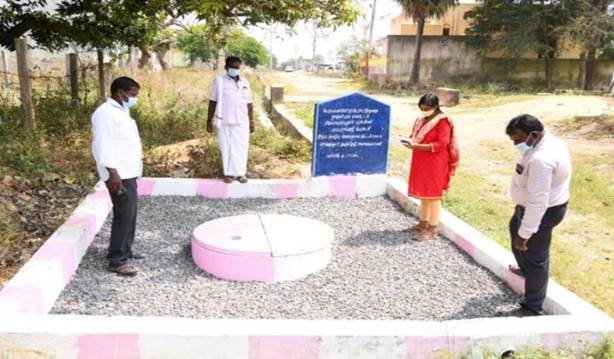
Greywater management: TN’s Pappankuzhi village shows the way

A greywater management system has been successfully implemented in Tamil Nadu’s Pappankuzhi village panchayat in the Kanchipuram district.
“The village has achieved 100% saturation of greywater management. The system which includes individual household soak pits and community soak pits with either horizontal or vertical type filters effectively treats about 42,000 litres of greywater that is generated per day in the village. The initiative is a part of the Swachh Bharat Mission Grameen (SBM-G) Phase II campaign of which greywater management is an integral component,” the Ministry of Jal Shakti said on Friday (July 15).
Also read: Illegal oocyte sale: Four private hospitals in Tamil Nadu to be sealed
What is greywater
Greywater is the category of wastewater that is not contaminated with faecal matter or urine. This includes used water from bathing, washing dishes, laundry, etc.
It was Swachhagrahi, A Sarla Devi who played a crucial role in creating awareness about the importance of solid and liquid waste management, highlighting the need for greywater management in the village. People were made aware of what greywater constituted and the hazards of improper management of grey water.
Thereafter, the president of the village, Ganesan and the Panchayat secretary played a vital role in advocating the need for greywater management and allocated the necessary funds to establish a system in Pappankuzhi in November 2021, the ministry said.
Also read: Wind power caters to a third of Tamil Nadu’s electricity supply
While the Panchayat took care of the operation and maintenance of the system, the community was encouraged to follow certain precautions to ensure better management. This included ensuring that waste was not dumped into the drainage channel; desilting was carried out to prevent stagnation of grey water and cleaning of the stormwater drain on a regular basis.
Situated in the Sriperumbudur block of Kanchipuram district, Pappankuzhi is made up of two habitations namely, Pappankuzhi village and Pappankuzhi colony with a total population of 1,016 from 474 households.
There are two overhead tanks in the village with a capacity of 30,000 litres each. Every day, about 60,000 litres of water is consumed by the households of which 70% becomes greywater that amounts to about 42,000 litres per day.
Cost of soak pits
Earlier, in the absence of such a system, it was common to see greywater being discharged onto the roads leading to pollution and stagnant water, the latter a breeding ground for mosquitoes, microbes and parasites that led to diseases such as Dengue, Malaria and Cholera.
Also read: Smooth ride: Tamil Nadu to get new fleet of disabled-friendly buses
To make matters worse, there was open dumping and discharge into water bodies which contaminated both the surface and groundwater in areas with a high water table. The community was also unaware that treated greywater could be used to provide relief from acute water stress.
Individual household soak pits which are suitable for managing greywater at the individual household level were constructed in 93 households at a cost of ₹9,300 each.
Further, two community soak pits with horizontal-type filters were constructed at disposal points of drainage systems at a cost of ₹1,33,000 each. Such soak pits are suitable for clusters with high groundwater table and the treated water can be used for agriculture purposes. Additionally, one community soak pit with a vertical type filter which is suitable for clusters with low water table was constructed at a disposal point of the drainage system at a cost of ₹127,000.

